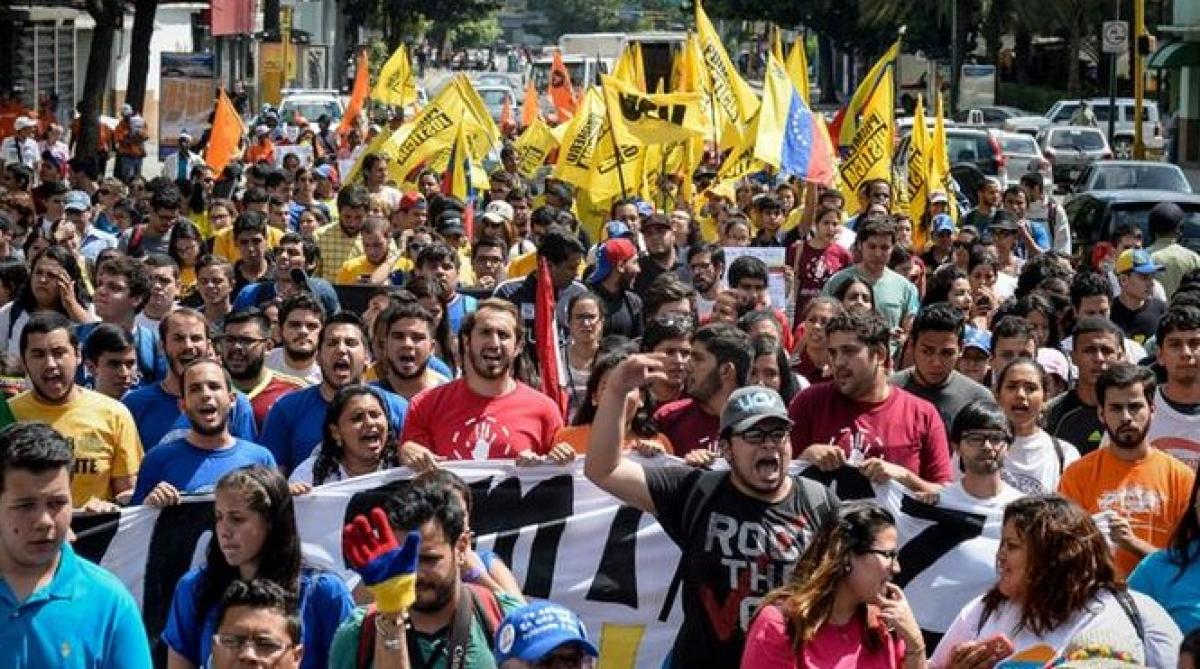Live
- Kanguva’s Box Office Disaster: Is This the End of Suriya’s Mega Hit?
- Maoist killed, jawan injured in encounter
- Kerala Police Officer Brutally Murdered By Estranged Husband In Tragic Domestic Violence Case
- Pallishree Mela records good sales at Bali Jatra
- Kharif paddy purchase begins in Bargarh
- Faeces forced into tribal woman’s mouth
- Hyderabad's Air Quality Worsens as Winter Settles In | AQI Levels Reach Moderate Range
- Dead' Man Wakes Up En Route To Cremation In Rajasthan; Three Doctors Suspended
- Odisha to study root causes for migration of labourers
- Forest officials accountable for wildlife deaths: Minister
Just In

Today Venezuela expects to have a high risk day as the opposition called for demonstrations to demand referendum to have President Maduro dismissed, in the wake of a sudden rise of tension between the two sides.
Today Venezuela expects to have a high risk day as the opposition called for demonstrations to demand referendum to have President Maduro dismissed, in the wake of a sudden rise of tension between the two sides.
Caracas, May 17, 2016 (AFP) -
Venezuela's opposition leader urged his country on Tuesday to defy a state of emergency decreed by the government as it grapples with an acute political and economic crisis.
Henrique Capriles spoke as the opposition-controlled congress prepared to debate the sweeping measures ordered by President Nicolas Maduro.
He said lawmakers will probably reject it, and that if the government insists the decree remains in force "it is up to us ... to ignore this decree."
That stance is likely to pit the congress not only against the presidency, but also the Supreme Court, which has
final say over the legality of the decree.
Many of the Supreme Court judges were appointed during the reign of Maduro's late predecessor, Hugo Chavez, and are seen as loyal to the government.
- Marches planned -
The decree establishing the state of emergency came into force for 60 days on Monday, after Maduro announced it last week.
Its first big test will come on Wednesday when opposition-led marches are to take place nationwide demanding electoral officials validate a referendum to oust Maduro.
Similar marches last week were met by riot police and tear gas.
Venezuela is facing hyperinflation, food and electricity shortages that are sharpening public anger against the unpopular Maduro.
But the president controls the levers of power.
And the measures in his decree give his government and security forces broad authorization to ignore most constitutional safeguards in a bid to keep order.
Venezuela's army is notably to be backed by civilians grouped into security units to tackle public unrest rising amid food shortages.
The text also authorizes the state to do what is necessary to ensure supply of basic foods and services and to counter a crippling energy shortage that has resulted in electricity rationing.
- 'Breathtaking' spiral -
The latest developments threaten to deepen the crisis in the oil-rich South American country, whose economy is tottering dangerously.
Venezuela is in its third year of recession, brought low by global oil prices that are a third of where they were when Chavez was in charge and spending freely on welfare programs.
The climbing social and political tensions are ringing alarm bells beyond the nation's frontiers.
The United States has described reports of Venezuela's spiral downwards as "breathtaking."
"The conditions for the Venezuelan population are terrible," said a spokesman for the White House in Washington, Josh Earnest.
But with Maduro alleging the US is behind much of the volatility, in cahoots with rightwing Venezuelan tycoons, Washington is choosing its words carefully so as not to be seen as meddling.
Maduro has ordered military exercises for Saturday to show Venezuela's ability to see off foreign "armed intervention."
In his decree, Maduro said the security measures will counter "destabilizing actions that mean to disrupt life inside the country or its international relations."
Individuals, companies and non-governmental organizations in Venezuela with links to foreign groups are also to be put under scrutiny and risk having their finances frozen.
- Firms can be seized -
The decree opens the way to businesses being expropriated if they are not seen to be doing enough to supply staple foodstuffs.
Company seizures could notably affect the Polar group, Venezuela's biggest food and beverage company, which halted beer production on April 30, saying it had run out of barley.
Venezuelan businesses say they are currently operating at less than 45 percent capacity because the government will not allow them to buy increasingly scarce dollars to pay foreign suppliers.
Polls suggest seven in 10 Venezuelans want a change of government.
The opposition says it has collected 1.8 million signatures to launch a recall referendum against Maduro.
But the vote must be held before January 10, 2017 in order to trigger new elections, and the opposition accuses the electoral authorities of stalling.
If held any later, a successful recall vote would simply transfer power to his hand-picked vice president, Aristobulo Isturiz.

© 2024 Hyderabad Media House Limited/The Hans India. All rights reserved. Powered by hocalwire.com







